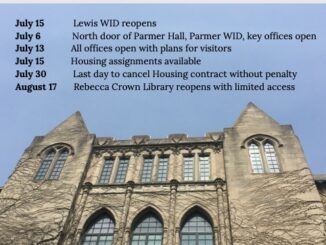
Maria Iman
Trump’s second-term will have a significant impact on higher education, particularly for international students. Many international students and staff members at Dominican are left feeling uncertain and worried.
During his last term in office, international students faced significant challenges in obtaining approval for their student visas. The documentations required became more complex, the processing time became longer, and security checks were extended.
Once Trump’s first term in office ended, the number of international students immigrating to the United States increased since 2021. As of 2024, there are approximately 1.1 million international students enrolled in higher education institutions across the United States. Of those International students, 62,299 are enrolled in a higher education institution in Illinois.
Over the last two years, Dominican has been trying to boost the enrollment of international students. During the pandemic, the number of international students declined significantly.
Many ELS centers, which offer English language programs and classes on college campuses, also faced closures due to the pandemic. Initially, the ELS center at Dominican was located on the Priory Campus before it was sold and shut down. Eventually, after the pandemic, the ELS program reopened, but this time it was relocated to Dominican’s main campus.
Nereida Encina, director of international enrollment, said she is focused on “rebuilding” the program, which has about 22 international students.
For students coming to the United States, they come in through a student visa, either on a J-1 or an F-1.
A J-1 visa holder is someone who may be here for an exchange program that may be a semester long. An F-1 visa holder is someone who is planning on coming here for an associate degree, bachelor’s degree, master’s, or doctorate.
If they are enrolled as full-time students, then they are maintaining their status here in the United States. After graduating, these students can also apply for OPT which is Optional Practical Training.
OPT’s are visas offered to international students after graduating. This allows them to work in the United States for up to a year. Unless they are in a STEM program, they can stay and work for about two years.
OPTs have been a helpful step for international students toward getting H1-B work visas, which allow them to stay in the U.S. and work for a sponsoring employer. H1-B work visas are usually really difficult to obtain.
ELS students are technically not considered Dominican students because they are only housed through ELS on the Dominican Campus and are not fully enrolled at Dominican. Some of them have conditional admission, which means that they would need to complete their English requirement before they can start as an official student at Dominican.
The anticipated changes from Trump’s administration regarding international education are a cause of concern for many including our international students here at Dominican.
Trump plans on changing the duration status of F-1 Visa holders. He wants to give international students a limited time frame of how long they can stay in the U.S. for their studies.
He also plans on changing the way F-1 visas are granted by decreasing the amount of F-1 and J-1 visas.
Throughout his presidential campaign, he has stated multiple times that he does not want any international students from enemy countries in the U.S. including China.
International students at Dominican do not receive any other financial aid besides merit scholarships. They must pay for the rest of their tuition out of pocket. The revenue generated from the students represents a significant source of income for the university.
With regards to travel bans, Encina said she thinks it’s very likely Trump will follow through with his plans.
“There will probably be a ban on certain Middle Eastern countries, Asian countries, African countries, since he’s done that in the past,” she says. “I definitely think it’ll be [harsher] this time around for international students.”
During Trump’s first term, he had a travel ban on countries such as Iraq, Iran, Somalia, Myanmar, and Nigeria.
Today, recruiting international students has already been challenging due to various global conflicts occurring in the world. Now, with Trump’s presidential election, there has been an added layer of uncertainty in the atmosphere.
“Recently, in September, I was in the Middle East recruiting. I was in Saudi Arabia and Jordan, and of course, things are really intense over there right now because of Palestine,” Encina said. “Other Middle Eastern countries are now getting involved. So, recruiting international students from there and then coming back to the U.S. and then having Trump win the election is kind of like, ‘Oh well, what’s going to happen with our partnerships now?’”
As of now, there are no definite answers as to what Trump will and will not do during his second term.
“When you look at international students and what they have to go through to get into the United States, then that is beyond our control,” Encina says. “If there is a specific ban or if USCIS is not allowing certain groups of individuals from attaining a visa, then there really isn’t much that Dominican can do. We can fight for students and advocate for students, but USCIS is this bigger umbrella of immigration.”
Although Trump claims that he will be fulfilling all of his promises, no one knows with certainty what will happen.
“He already said he is going to remove many people from the country. He has said all of those things, but do we know to what extent or what he plans on doing?” she says. “I think everyone is a little bit nervous about what’s going to happen. We’re trying to prepare as best as we can to support our students. The only thing everyone in education can do is stand together and support one another. That’s the best thing that we can do right now.”


